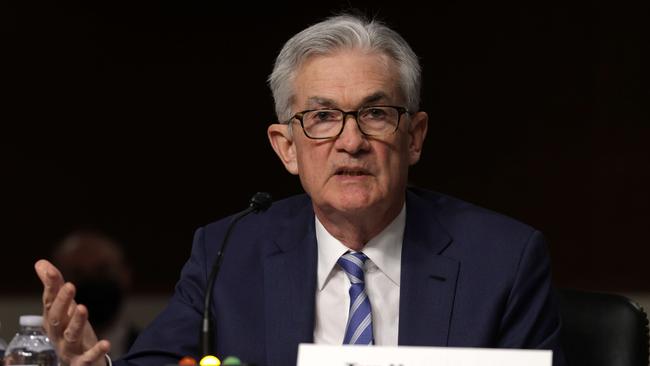Federal Reserve chair Jerome Powell signals interest rates could rise sooner to contain inflation
Investors dump shares after US Federal Reserve chairman Jerome Powell signals interest rates may rise sooner to contain inflation.

A more ‘hawkish’ Federal Reserve Chairman has signalled interest rates could rise sooner to contain inflation, sending share prices sharply lower on Wall Street as uncertainty about the impact of the Omicron variant weighed on financial markets for the third day.
In Congressional testimony Jerome Powell said the Fed would consider tapering its asset purchase program even more quickly when it met next, conceding that high inflation – which Fed officials had earlier said would be ‘transitory’ – would last until the middle of next year.
“The economy is very strong and inflationary pressures are high, and it is therefore appropriate in my view to consider wrapping up the taper of our asset purchases, which we actually announced at the November meeting, perhaps a few months sooner,” he said.
“The threat of persistent higher inflation has grown, my baseline is still that it will move back down over the course of next year closer to target, but clearly the risk of more persistent inflation has risen,” Mr Powell said at a hearing Tuesday morning before the Senate Banking Committee.
The benchmark US stock index S&P500 dropped 1.9 per cent on Tuesday, with much of the fall occurring after Mr Powell spoke, a decline that more than erased Monday’s rebound.
“Despite the downside risks to economic activity from the Omicron variant, Chair Powell struck a more hawkish tone,” said Oxford Economics analyst Kathy Bostjancic.
Uncertainty about the severity and transmissibility of a new Omicron variant of the virus that causes Covid-19 have rattled financial markets since Friday, clouding the outlook for inflation and economic growth. Dozens of countries have imposed travel bans from southern African countries as scientists scramble to ascertain how much damage Omicron could cause.
“The recent rise in Covid-19 cases and the emergence of the omicron variant pose downside risks to employment and economic activity and increased uncertainty for inflation,” Powell said Tuesday, suggesting it could even push up inflation if it intensified supply chain disruptions.
The Federal Reserve had already determined it would start to reduce the monthly rate of asset purchases, $US120bn ($A168.37bn) since March 2020, by $US15bn in each of November and December, paving the way for an official increase in interest rates.
Since then, US inflation has climbed to 6.2 per cent, the highest level in 31 years, over the 12 months to October, as government stimulus payments and post-Covid-19 restriction supply bottlenecks increased demand and crimped supply, according to economists.
“You’ve seen our policy adapt and you’ll see it continue to adapt to we will use our tools to make sure that higher inflation does not become entrenched,” Mr Powell said, pointing out the inflationary spurt had meant the Fed had achieved its policy target of averaging 2 per cent inflation over time.
“Inflation has run well above 2 per cent for long enough that if you look back a few years inflation has averaged 2 per cent,” Mr Powell, whom president Joe Biden endorsed for a second term last week, said.
The Federal Funds rate, the target rate of the Federal Reserve, has been in effect zero since April last year, fuelling a boom in share and house prices across the US.
“Should policymakers stick to their guns on policy tightening, we may well see further dollar strength in the coming weeks,” said Jonas Goltermann, a senior economist at Capital Economics.
The Australian dollar has fallen around 4 US cents against the US dollar over the past month to US 71 cents, near the lowest level in a year.
Mr Powell said he would no longer describe inflation, which has been above 5 per cent according to the consumer price index for more than six months, as ‘transitory’.
“We tended to use it to mean it won’t leave a permanent mark in the form of higher inflation …. [but] it’s a good time to retire that word and explain more clearly what we mean,” he said.




To join the conversation, please log in. Don't have an account? Register
Join the conversation, you are commenting as Logout